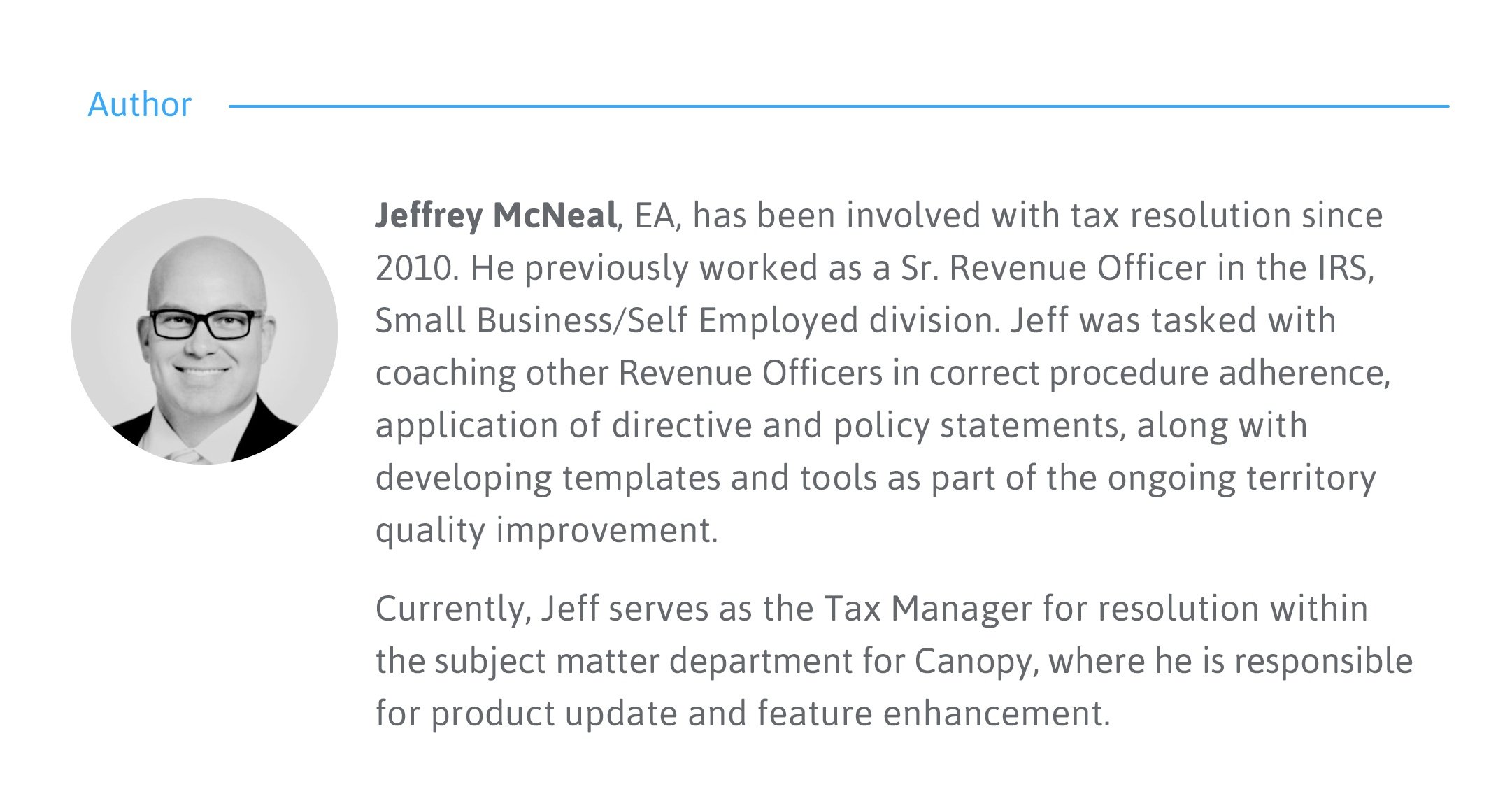By now in our blog series we’ve discussed several aspects of offer in compromise: which clients make good candidates, real reasons your client’s case would get flagged, how Canopy can help you avoid mistakes, etc., but what if your client’s offer gets rejected? What do you do then? Fortunately, you have options.
If you’re not confident that your client has good grounds for an appeal, you can look into alternative methods of tax resolution. If you still think offer in compromise is your client’s best option, and you believe that you can make a strong case for acceptance, you can request an appeal. In this post I’ll take a look at common reasons we rejected offers at the IRS and how to request and negotiate an appeal if you choose to do so.
Why Your Client’s OIC May Have Been Rejected
When we rejected an offer at the IRS, many rejections fell into a few common categories. Common reasons for rejection include:
Collectibility: This is the most common reason an offer is rejected. If your client’s offer is rejected on the basis of collectibility, it means the IRS views the offer amount as too low based on your client’s income and ability to pay (such as the examples we looked at in Part 2). The IRS will use Form 433-A and other documentation to determine your client’s financial condition. Keep in mind, the IRS considers potential earning capacity when considering an offer, not just current income and financial hardship.
Additional Tax Debt: After you submit your client’s offer, they must stay in compliance with the IRS. If they continue to accrue tax debt by not paying estimated tax payments, the IRS will reason that your client is not likely to be compliant with the potential offer in compromise. You should help keep your clients responsible and on track.
Frivolous OIC: A frivolous offer is one that is submitted solely for the purpose of delaying collection. Your client may want to buy themselves time, but the IRS will reject this type of offer immediately. As the tax professional, you need to weed these out. The IRS will know if an OIC is frivolous by red flags such as if your client shows the ability to pay a certain amount of debt but the offer is made for significantly less than that amount (without extenuating circumstances). As a Revenue Officer, I came to recognize which practitioners were responsible and which were likely to send in frivolous offers.
Additionally, while submitting an offer delays collection, it also freezes the statute of limitations for the time the offer is being considered plus adds 30 days, so it’s not in your client’s best interest to submit a frivolous offer.
Failure to Pay: In some cases, a previously accepted OIC can be retroactively rejected due to failure to pay. If your client’s offer is accepted, they must file and pay their taxes in a timely manner for the next five years. If they do not, the OIC can be removed and the full tax debt will be reinstated.
Remember, an offer being returned is not the same thing as it being rejected. An offer is returned when the taxpayer didn’t submit necessary information, filed for bankruptcy, failed to include required application fees, hasn’t filed required returns, or hasn’t paid current tax liabilities. You can’t appeal a returned offer, but once the offer is updated it can be submitted again.
That being said, it is in your client’s best interest for their application to be filled out completely. Their case should be organized and easy to follow the first time you submit it. By the end of my time with the IRS, I had 40 to 45 cases I was handling at any one time, and that was not unique to me. Everyone at the IRS has a hefty caseload. Because of those hefty caseloads, the easier it is for a Revenue Officer to follow the logic you present in the case, the better chance you have of getting your client’s case through quickly and successfully. Plus, Revenue Officers and Offer Specialists have to justify everything they approve to their managers, so the easier you make it for them to see the justifications in your client’s case, the easier it will be for them to keep the case moving forward.
Request an Appeal
Now that we’ve gone over why your client’s offer may be rejected, let’s talk about what to do with a rejection. If your client’s offer is rejected, they will receive a letter from the IRS in the mail. In that letter, they will find the reason for rejection, as well as instructions for how they can appeal the decision. Urge your clients to open any mail from the IRS immediately. The IRS will provide detailed instructions for actions going forward, but there’s a limited time frame for taking those actions. Your client must submit an appeal to the Office of Appeals within 30 days of the date on the letter.
These are the grounds for requesting an appeal as stated on the IRS website:
- You believe the IRS made an incorrect decision based on a misinterpretation of the law.
- You believe the IRS did not properly apply the law due to a misunderstanding of the facts.
- You believe the IRS is taking inappropriate collection action against your client, or your offer in compromise was denied and you disagree with that decision.
- You believe the facts used by the IRS are incorrect.
If you determine that there are grounds for an appeal, you’ll need to submit Form 13711, “Request for Appeal of Offer in Compromise.” This form should address the issues that were raised in the rejection letter, and your client will likely need to provide additional documentation.
Negotiating an Appeal
To argue any of the grounds for appeal you need to be prepared to support your position with records, evidence, and procedures. An appeal is essentially a discussion between the Appeals Officer and you on behalf of your client, and all appeals decisions are final. If you want to win an appeal you have to justify your client’s position by referencing your documentation and tying it together with the IRM, IRC, and court decisions correctly.
Keep in mind, ex parte communications are prohibited in the IRS which means an Appeals Officer cannot talk about your client’s case with the Offer Specialist who rejected it. Because of the unbiased nature of Appeals Officers, you can make your original case to them if you believe you have already included sufficient evidence. If your client’s offer was rejected based on lack of evidence, you’ll want to strengthen your case before sending it to Appeals. If you’ve already exhausted IRM and IRC references, try using case law.
Additionally, it can be effective to play to the emotional side of the argument—Appeals Officers are human after all—but it should be the “cherry on top” of your argument, not the basis. During my time at the IRS, I never lost an appeal hearing because I rooted my arguments in the IRM and IRC, and you can expect other IRS officers to do the same.
As I mentioned in Part 1, the IRS rejected 36,000 offers in 2016. While the acceptance rate for offers in compromise has increased from 25 percent in 2010 to around 42 percent in 2016, there’s still a good chance your client’s offer will not be accepted. Again, the best thing to do to increase your chances of success is to be sure you can back up the foundation for your client’s case in facts and IRM references. I can’t emphasize the importance of using the IRM to support your claims enough.
Thank you for reading our 5-part offer in compromise blog series. I hope you feel like you’re now better equipped to handle offer in compromise cases. If you want to learn even more about OIC you can check out these blog posts:
A Crash Course in State-Specific Offers in Compromise
How to Prepare an Offer in Compromise (video)
6 Pro Hints for Preparing an Offer in Compromise
The Ultimate Guide to Offer in Compromise Rejections
A Foolproof Guide to Getting Your Offer in Compromise Accepted
Partial Payment Installment Agreement Vs. Offer in Compromise: Which is Better?
You can also download Canopy's offer in compromise ebook for free below, or you can reach out to me directly at jeffrey.mcneal@canopytax.com. I’m happy to discuss any questions.
Disclaimer: Tax law is complicated. Nothing I’ve said here should be mistaken for authoritative legal advice. Similarly, my commentary on my time at the IRS is reflective of my personal experience and not any official stance or policy of Canopy or the IRS.








Get Our Latest Updates and News by Subscribing.
Join our email list for offers, and industry leading articles and content.